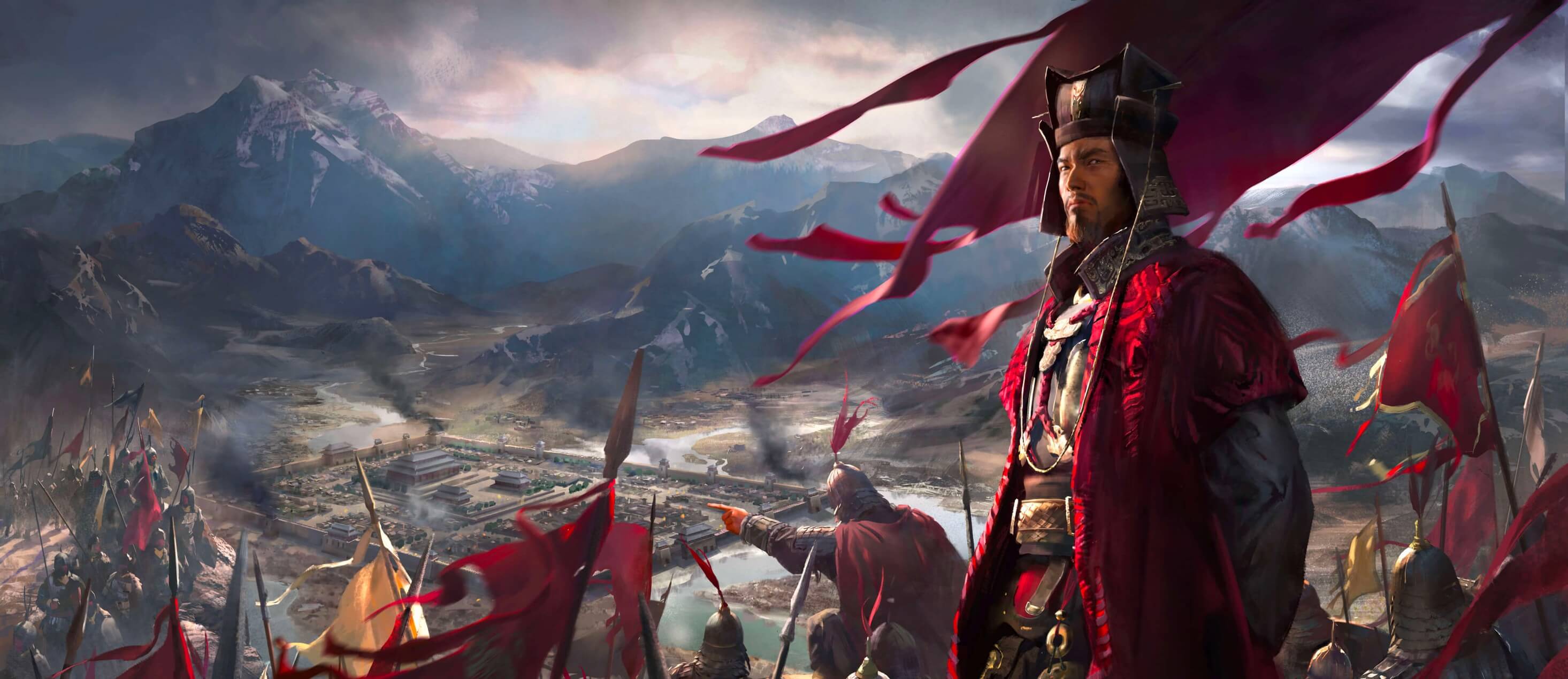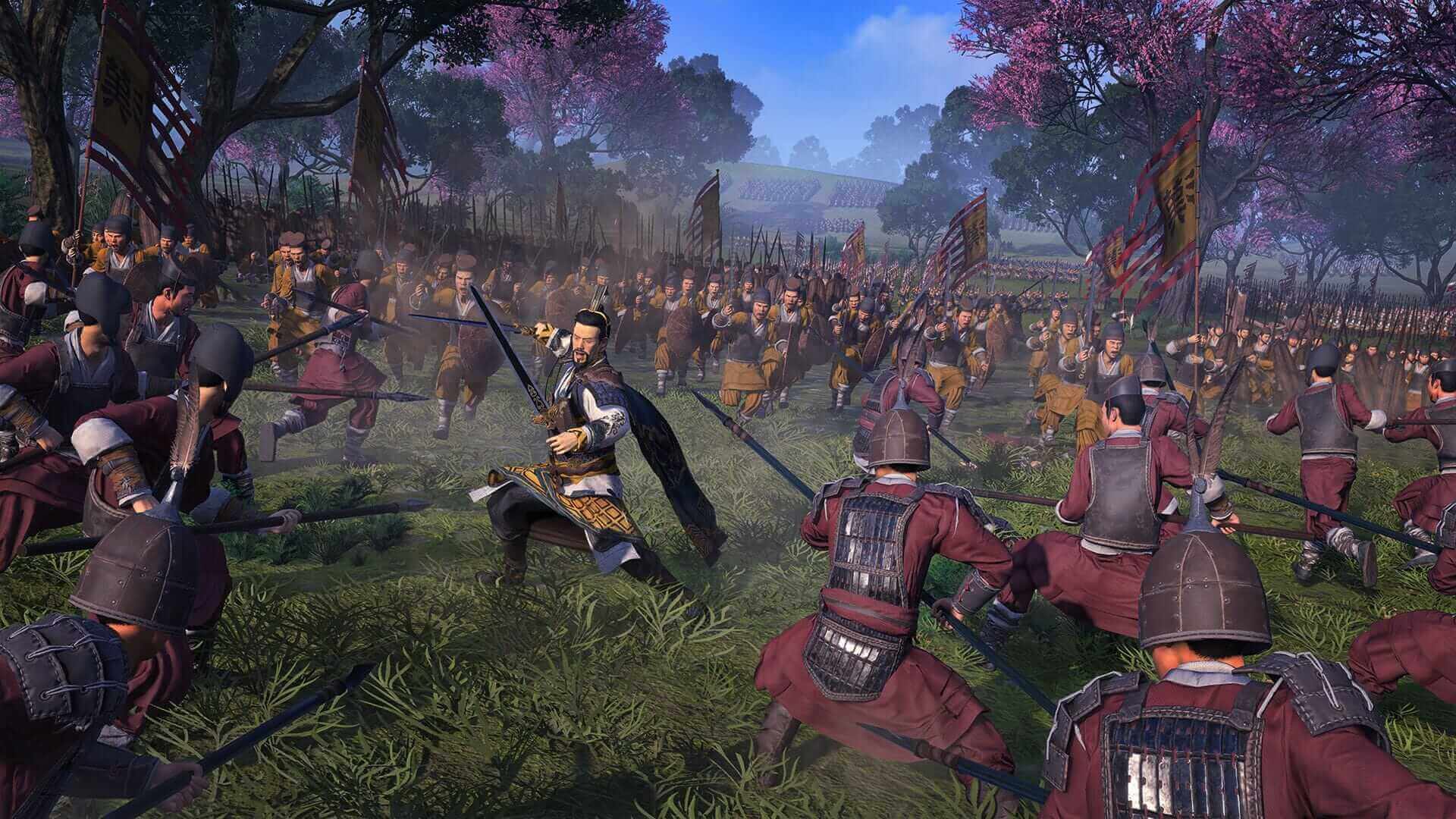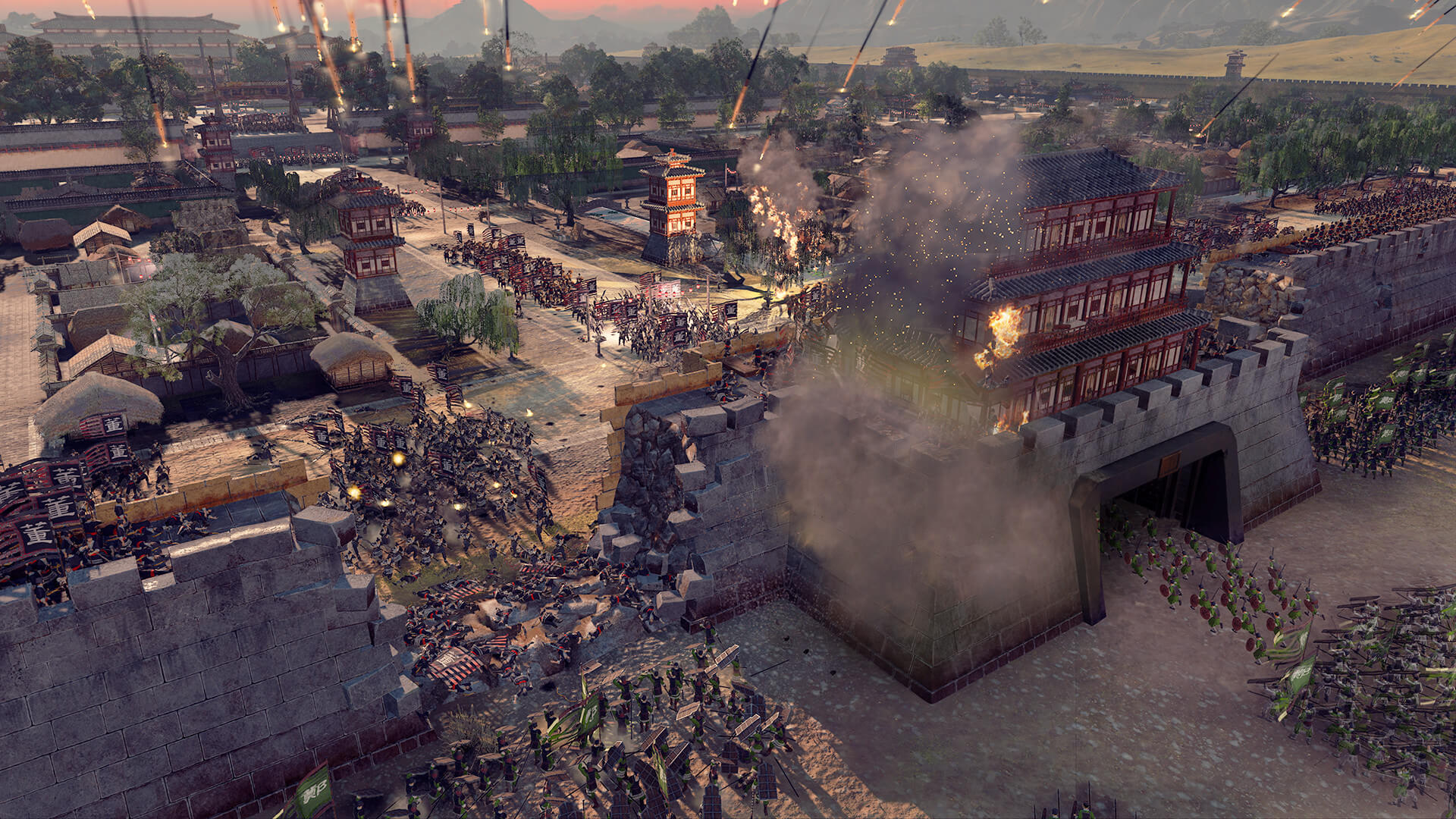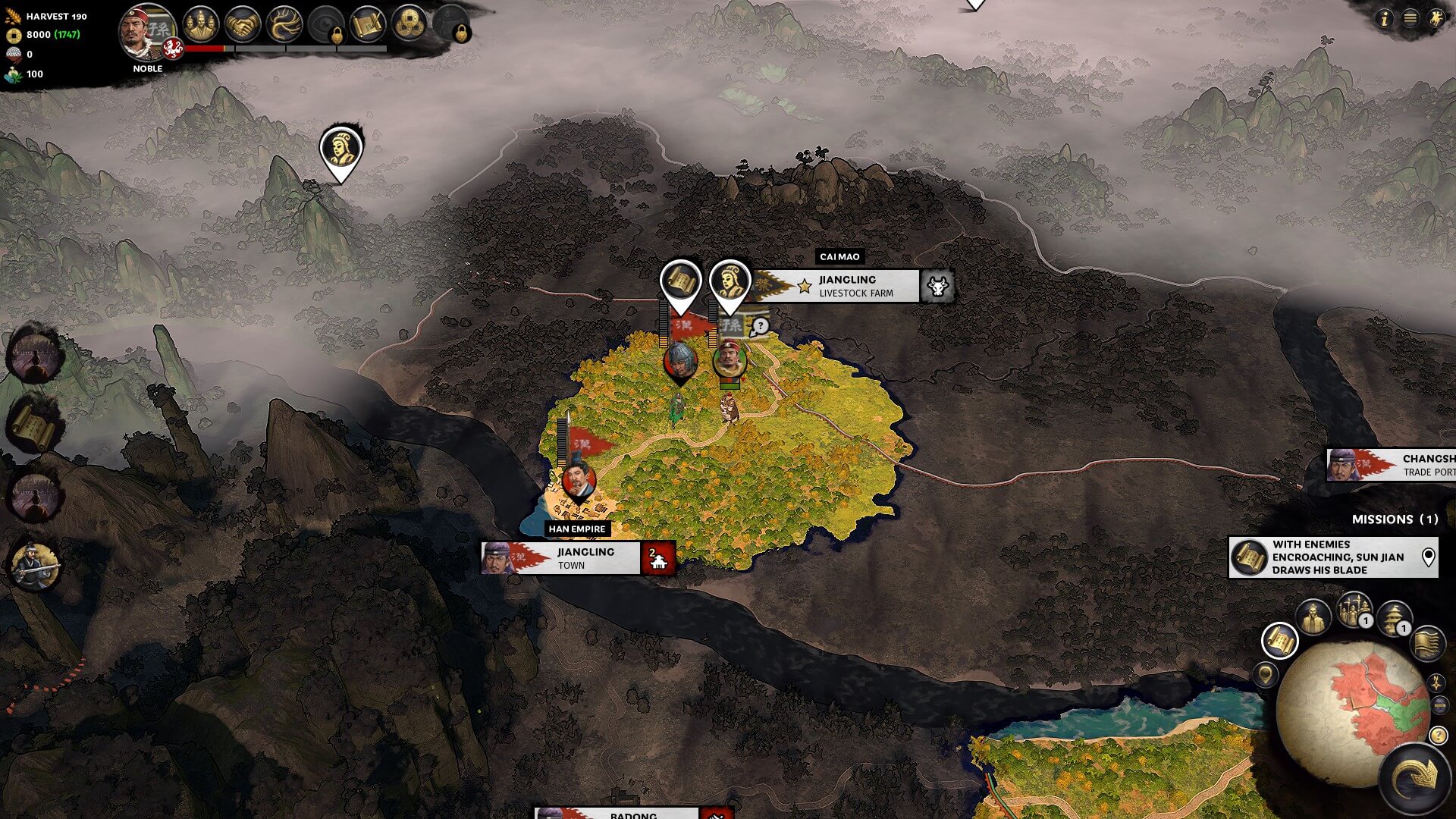 Ever since Rome 2's disappointing release back in 2013, it feels like the Total War series has been lost and in search of something. From Attila and Thrones of Britannia's tinkering to the Warhammer games' explosion of personality there has been wild experimentation between titles. Three Kingdoms is the culmination of that adventure.
Ever since Rome 2's disappointing release back in 2013, it feels like the Total War series has been lost and in search of something. From Attila and Thrones of Britannia's tinkering to the Warhammer games' explosion of personality there has been wild experimentation between titles. Three Kingdoms is the culmination of that adventure.
The release of the Warhammer games over the past few years marked a potential schism for the series, long a plaything for those very into history. Here were two strategy titles that, rather than sticking to a time period like Medieval Europe or Shogunate Japan, were set in a fantasy world, and rather than agonising over musket accuracy threw realism out the window in favour of magic powers and RPG-like gear loadouts.
Total War's return to a historical setting in China was tinged, then, by the fact it was set during the events of the famous Romance of the Three Kingdoms, a book that's as much about myth and legend as it is hard facts. A lot of fans, myself included, suddenly had grave fears for the future of the series: had a fantasy sideshow, as fun as it was, spoiled Total War's appetite for history, and left the games at the mercy of a need for super-charged hero units?
The short answer is no. The longer answer is lmao of course not, this game is amazing.
What Three Kingdoms does to address this potential divide is just... walk it. When you launch a campaign in this new game, you're asked whether you want to play "Romance Mode" or "Records Mode". The latter is more of a straight-up Total War game, with stuff like infantry movement handled much the same as older games.
The former follows on from Warhammer's success by letting players get wild with their Total War, and it's where the real fun is at. This mode speeds up real-time battles and even introduces leader duels, a first for the series where rival generals can call each other out across a battlefield and engage in 1v1 combat that, aside from looking amazing, can help turn the tide of battle in a heartbeat.
I preferred Romance Mode, but what's cool is that Records Mode doesn't feel like a lesser experience, just a different one. And it's testament to the balancing act Creative Assembly have managed here, and the strength of Total War's "overworld + real-time battle" foundations, that the game is able to support both options and that both are still so much fun.
Of course, it's also the changes made to those foundations that go some way to letting them pull it off. Three Kingdoms just feels smarter, smoother and more responsive over the course of a campaign than any previous Total War. I'm not talking about its framerate or load times (which can be agonising if you don't have an SSD), but the overall flow of the game.
Total Wars often struggle with their endgame and campaign progression, with little incentive for players other than a quest to "paint the map", and a succession of ideas on how to make victory interesting---ranging from Shogun 2's civil war to Warhammer 2's complex portal system---have never quite got there.
Three Kingdoms gets a lot closer, keeping campaigns dynamic and interesting right through to the very end. Even better is that, your path to victory will be different depending on which type of faction you choose, making campaign replays a fresh challenge each time.
The balance of the game feels great as well. Whether it's food production (used mostly as a handbrake on rapid expansion), the economy or population happiness, stuff that has previously been a frustration in a Total War game feels more generous here, as though it's being generated more as a result and reflection of what I've done/built rather than a limitation being imposed on me by the AI.
Taking another cue from Warhammer, Three Kingdoms relies heavily on personality, perhaps a little too much. Your armies are now usually led by three generals, not just one, and each can be levelled up and equipped with custom gear. By the end of the game that's a lot of man (and woman) management to be taking care of, with matters not helped by the fact the game has a limited roster of character art, which makes identifying exact characters harder than it could be (a problem that affects campaign leaders as well).
Many of these characters will end up as Generals, though not all; combining Total War's long-running family politics system with something a little more Crusader Kings II, your faction members now aren't just put in positions of command but also have their own ambitions and relationships, so if you stick two generals who hate each other in the same army, you are going to have problems.
Indeed personality extends past characters and into the factions themselves, which are no longer represented by states or tribes, but by leaders, in a way that's similar to the way Civilization pits players against once another.
Three Kingdoms is utterly committed to its theme, to a degree we haven't seen a historical Total War go since Shogun 2. The game revels in its Chinese setting, with a wonderfully bold color palette lighting up the map, gorgeously varied battle maps and music that's appropriate without getting corny. Particular shout-out to the tech tree that is literally a tree.
That all results in a gorgeous game to look at, but weirdly the real visual star of Three Kingdoms is its interface. I know that sounds boring, but it's a remarkable achievement what Creative Assembly have done here, and it's more important to a game like this than you may think. I'm continually critical of Paradox games for their interface, because it presents a barrier to entry and can obscure vital information. Here, it's the opposite: Three Kingdoms is in love with the idea of clean little mouse-over pop-ups, and I in turn love the game for it.
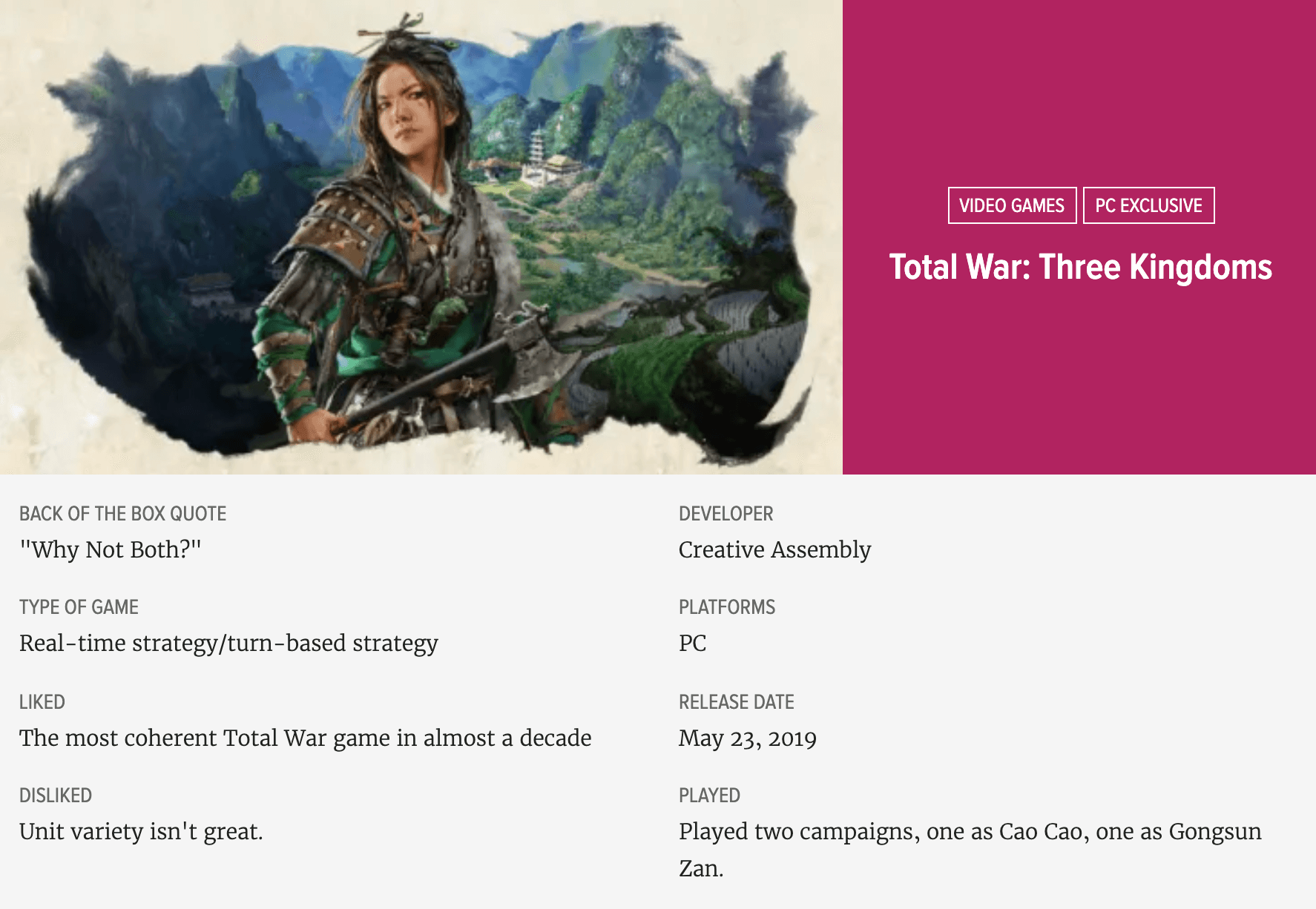
By opting to present much of the game's more nuanced information (not to mention helpful tips on how pretty much every button and system works) as a pop-up, Three Kingdoms is able to keep its interface simple, without the need for a screen full of menus and buttons, and once you learn that nearly all the game's information can be found this way, it's a breeze keeping on top of everything you need to at the head of a growing empire.
The idea that information is woven through Three Kingdoms, rather than stratified in menus, even extends to the use of colour. Most of the things you use in the game, like Generals, units, buildings and tech projects, are colour-coded, and the colours are assigned according to the principle of The Five Elements.
It's very meta, but the game actually adheres to this, with the five colours/elements affecting everything from which units are best suited against which to the types of missions a particular General might excel at. It's the crowning achievement of an interface that's an absolute triumph, and which sets a new benchmark not just for Total War games, but for strategy games in general.
If the last few Total War games really were experimenting ahead of the next big historical game, then it was an unqualified success. Three Kingdoms is a greatest hits package of Total War's recent history, marrying Shogun 2's thematic perfection with Warhammer's personality and the minor (but important) changes games like Thrones made around the edges.
For those new or interested in the series, this is absolutely the best place to start, as it'll ease you in and communicate its complexities better than any other Total War. And if you're experienced, you'll just love how this is a smoother, smarter ride. Three Kingdoms isn't a perfect Total War game, but it's the closest the series has come in a long time.
